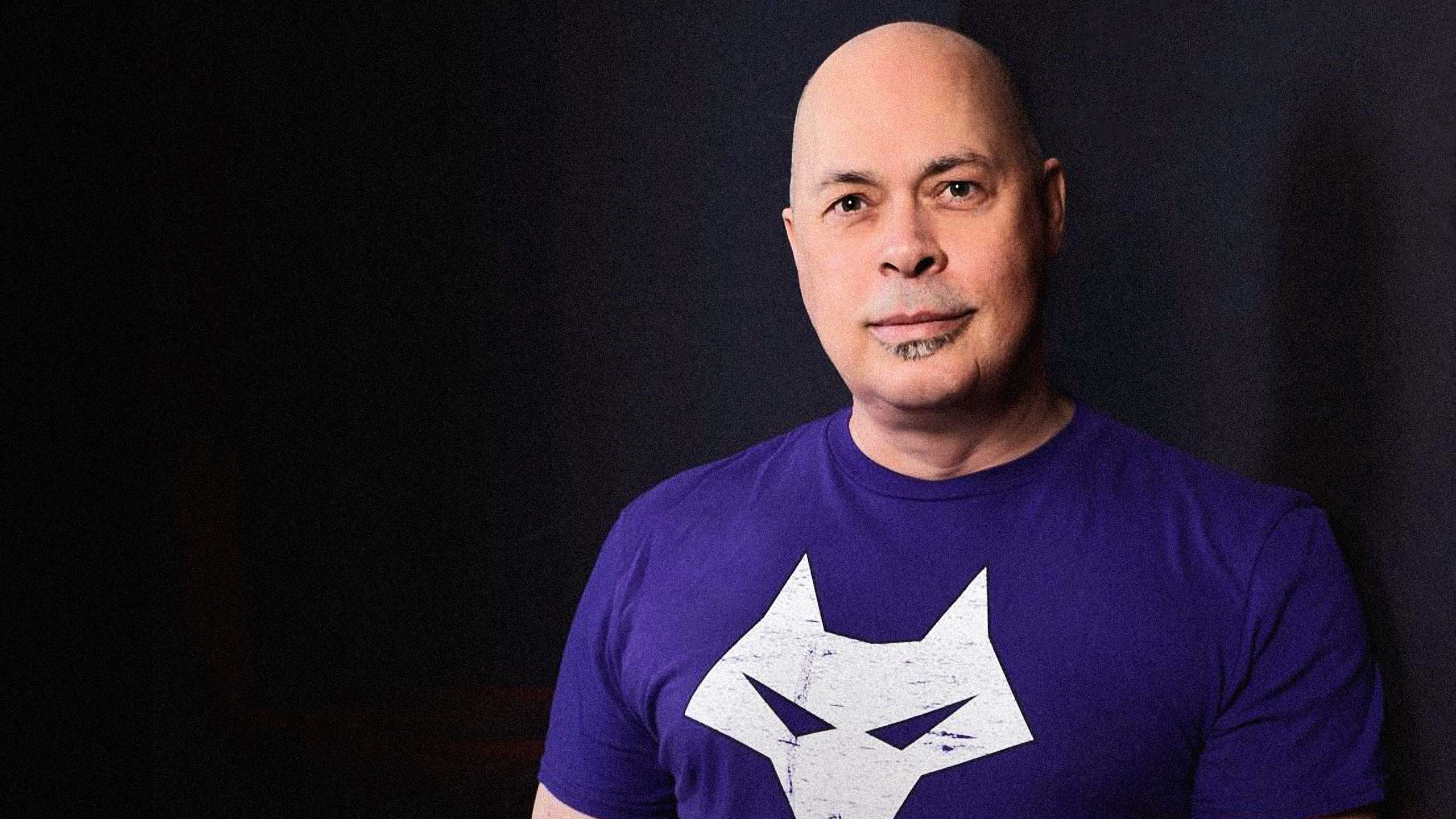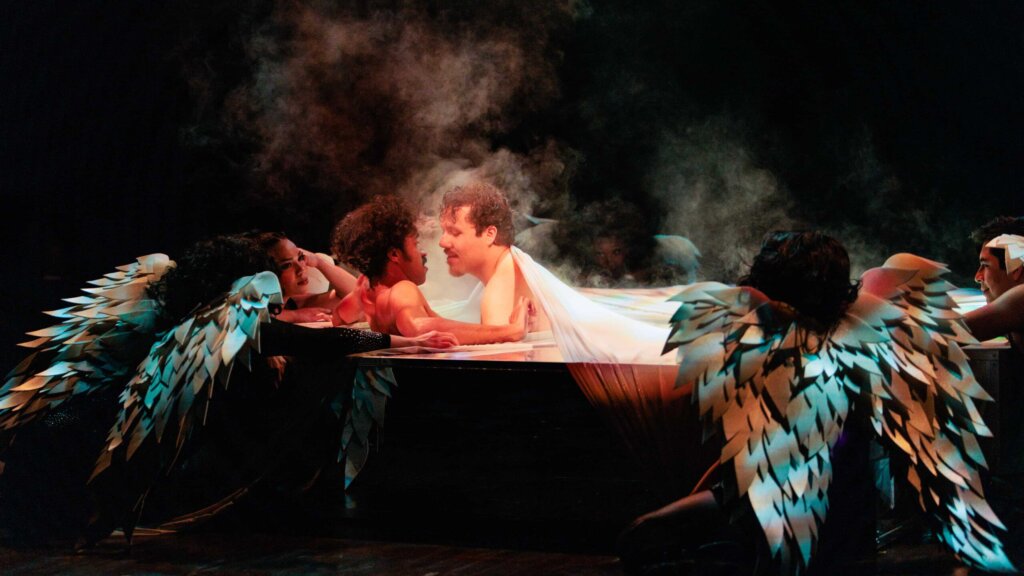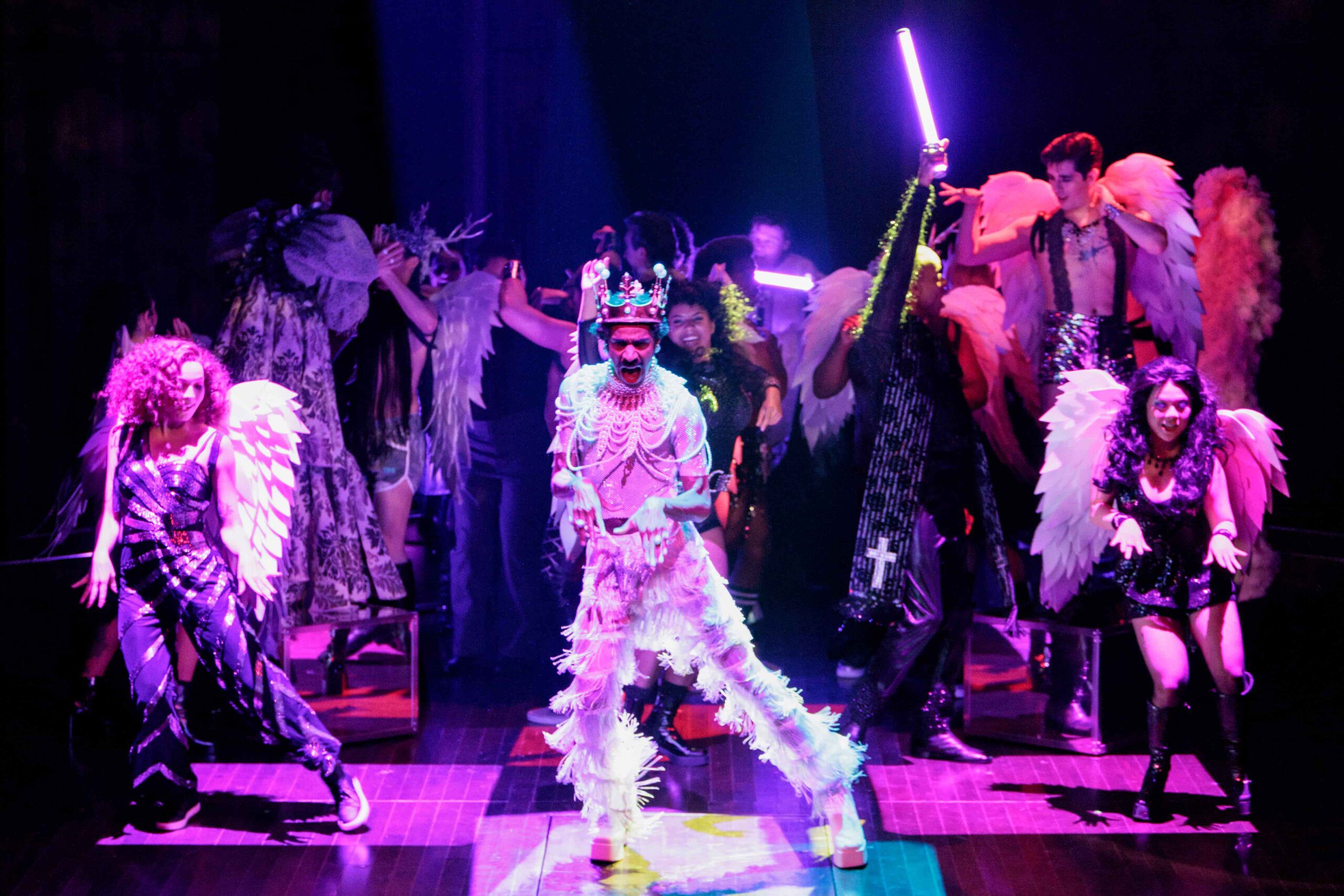Shakespeare is sexy, violent, dramatic and fun. But you wouldn’t always know it.
Although Shakespeare wrote plays for commoners, his words have become so canonical over the centuries that performances have slipped into the realm of high culture. Shakespeare in the Park festivals have tried to democratize the plays, and the stories have inspired other more accessible works: Romeo and Juliet became West Side Story, Macbeth and King Lear became Throne of Blood and Ran, while the Henry plays became My Own Private Idaho. But most people have never experienced a full-scale theatrical performance of the Bard’s original words as the pure entertainment he originally intended.
Enter Brad Fraser. The iconic gay playwright has adapted one of the Bard’s lesser plays, Richard II, opening this week at the Stratford Festival, jettisoning entire scenes, fusing and removing characters and importing lines from Shakespeare’s other works. It still sounds like Shakespeare, but it’s not Shakespeare’s Richard II, per se.
The original Richard II, based loosely on the life of the historical 14th-century monarch, chronicles the downfall of the title character, after the banished noble Henry Bolingbroke (the future Henry IV) returns to England and gathers an army to depose Richard and reclaim his land.
Director Jillian Keiley had conceived a version of the piece set in New York City at the start of the AIDS crisis. After reading Fraser’s memoir, All the Rage, which covered the same era, she asked him to tackle the adaptation. Fraser, best known for his 1989 breakthrough play, Unidentified Human Remains and the True Nature of Love, has enjoyed a four-decade career that includes writing and directing a 1994 cinematic adaptation of his play Poor Super Man and producing 14 and writing eight episodes of the first U.S. remake of Queer as Folk. His most recent original piece from 2022, Shelley’s Shadow, is about an aging lesbian struggling with dementia.
When Keily approached Fraser about Richard II, Fraser admits, he didn’t remember the play. “I’d completely forgotten there was a Richard II,” he says over a Zoom call from his Toronto apartment. “It’s boring, and he doesn’t shut up,” he says. “The play becomes laughable after a while.”
The initial draft was more truncated than Keiley expected, but she was delighted with its brevity. Fraser considered it a good edit, but felt it wasn’t a Brad Fraser play yet. “I’d worked out the relationships, but I wanted to bring some sex into it and play around,” says the writer. So he turned to Shakespeare’s other works, mining the plays and sonnets for additional material.

Playwright Brad Fraser. Credit: David Hawe
“I pillaged the oeuvre to find sex-related and queer stuff,” Fraser says. “I collected it all, put it in a file, and played around with putting different dialogue together to make new scenes, and I came up with an entire sex scene, which is not in the original at all, and a subplot about Willoughby [a noble who joins Henry’s side] becoming infected with HIV.” Fraser’s additions include a gender-swapped Northumberland (another deserter, played by Sarah Orenstein), making the character a powerful female foe for Richard (Stephen Jackman-Torkoff). Fraser also beefed up the role of the loyal Duke of Aumerle (Emilio Vieira), combining the character with another henchman. Fraser credits director Keiley for inspiring him to rewrite the Duke as Richard’s male lover.
“Jill mentioned she’d heard of a production where Aumerle did the killing [of Richard],” Fraser says. “In that version, he and Richard were still cousins as in the original play, and I thought that was interesting. But what if I made them lovers? If you’re going to raise the stakes, you have someone kill their lover at the end of the play. You can make no greater dramatic decision as a writer, and it felt Shakespearean to me.” That spark also humanized and strengthened the title character. “I tried to find the strongest narrative threads and weave them together,” adds Fraser, “The best way to make Richard a more relatable character was to give him a relationship and stakes he didn’t have in the original play.”
Fraser is no stranger to retooling the Bard. A decade ago, at 53, Fraser enrolled in the University of Toronto’s Theatre and Performance program, where he adapted three of Shakespeare’s plays as part of his studies. In 2017, he adapted All’s Well That Ends Well for director Peter Hinton in a Calgary production by The Shakespeare Company, Myth Productions, and One Yellow Rabbit.
“A lot of what I’m doing is sampling his work. The guy’s been dead 500 years and it’s like a cover tune that’s been reinvented. I took the basic song and cut it up, moved it around, switched things out … then, I took well-known lines from other plays and intentionally used them to create a kind of dissonance in the mind and ear of the listener because you recognize the words, and yet you know they shouldn’t be there,” Fraser says. “It’s like the chorus of Juice Newton’s ”Angel of the Morning” weaving in and out of a hip-hop song. For me, it’s kind of that thing on an intellectual level, except the music I’m sampling is the music of Shakespeare’s language.”
The musicality of Fraser’s approach fits well with the production. The playwright praises Keiley’s direction and Cameron Carver’s choreography. “It’s genius,” he says. “The show almost feels like a musical to me in its theatricality and the way it moves. There’s a smoothness and adroitness to everything on stage, reflecting how I remixed and sampled Shakespeare.” Composer Andrew Craig, aka Rhapsodius, complements the staging with a soundtrack that shifts from disco to new wave and synth-pop as the story progresses from the 70s to the ’80s when the AIDS crisis was at its height.
Fraser also has kind words for the young cast., “Most are under 35 and very diverse, racially and class-wise, not just the white kids who went to university, you used to get 20 years ago.” He also recalls a realization about the setting when discussing with Keiley and creative consultant Sarah Garton Stanley: “People our age [in their 50s and 60s] will say that the disco backdrop makes it contemporary, and we were heartbroken when we realized it was historical.”

Jackman-Torkoff, with Emilio Vieira as the Duke of Aumerle. Credit: David Hou/Stratford Festival
Now in their second season at the festival, Jackman-Torkoff had substantial parts in last year’s productions of Little Women and the queer-themed Every Little Nookie. Aside from the lead in Richard II, they are also cast in this year’s new translation of Eduardo De Filippo’s Grand Magic, which opened earlier this month. They were asked to audition for the role of Richard last year and decided to make the part their own. “I love the idea of being a lead, and I was excited when I heard what it was about and that Brad was working on it,” they say over Zoom from Stratford. “I love Shakespeare and never felt any limitations about what I could play. During the callback, there’s a part where Richard’s giving Bolingbroke the crown, and I took out scissors and cut my skirt into a mini skirt. It was a big choice, and I forgot my lines after I did it, but I wanted to put myself out there.”
Having landed the part, they carved out a character that amalgamated Shakespeare’s Richard, Fraser’s version, the historical king and the artists from the ’70s who inspire them. “I get to put so many threads into one character, and they all feel aligned to me. And Richard is like a new friend, a cool inspiring person to get to know. Playing this role is elevating my life because I have to meet him in the moment and take care of myself at the same time, which is hard but feels so good.”
The actor put a lot of their personal grief and real-life experiences of love as a young queer of colour into the portrayal of Richard. “He loses so much, but part of him always holds on to the love he’s had,” explains the actor, who was raised in a white foster home in the Toronto suburb of Richmond Hill. “I experienced a lot of loss and grief in my life, including the deaths of family members I hadn’t met, birth brothers I was just getting to know, and someone who was like my dad, even though I didn’t call him that. I didn’t know where to place the grief, and I cried so much I thought I would die.
“I brought all of that into my performance,” Jackman-Torkoff says. “I’m also a lover. I love people and put that in, too, as well as some of the shame from when I was younger and couldn’t share who I was. I put threads of myself where they worked, but the part of me that’s different is that Richard’s uncaring about people at the beginning of the play because of his power, and I don’t think I’m like that. But I bring my personal values of freedom, openness and playfulness into the role.”
Jackman-Torkoff’s energetic portrayal heightens the doomed king’s internal struggles while losing his grip on power. As the play approaches its tragic conclusion, Richard is imprisoned in the Pontefract Castle to live out his remaining days after surrendering the crown. At this point, the deposed king emerges from a cloth sack to contemplate the events that led to his downfall in the play’s pivotal speech.
The scene is beautifully staged by set designer Michael Gianfrancesco and lighting designer Leigh Ann Vardy. The stylized prison cell is a giant disco ball lowered to the stage and surrounded by pillars of light. In the second preview I attended, Jackman-Torkoff contorted their body and filled the constrained space with movement while lamenting Richard’s misfortune and solitary confinement. The actor has since modulated their performance after discussions with director Keiley.
“As an artist and a person, I have a lot of movement and can be quite large,” they admit. “From the second preview onwards, I found more stillness in my performance. It’s something I’m exploring with our director; not only having the courage to be big, but also the courage to be small, not in a negative way, but a focused one. It’s the moment where I feel most comfortable during the play because it’s scary to perform and open yourself up to people. But when I get to be in that private space, it feels kind of good.”
That pivotal scene presents a positive message, according to Jackman-Torkoff. He compares Richard to the Fool card in a Tarot deck, which can represent an end or a beginning. “It’s like a place of possibility,” they say. “We could be all or nothing: whether we have a crown or no money, whether we’re queer or look like this or that, are our narratives good or bad? The worst and the best are possible within us, so I try to end that moment of my performance before it sours.”
Like Fraser, the actor questions the orthodoxy of faithfully rendering Shakespeare’s texts, citing comments by people who haven’t seen the show. “They’re just kind of talking about how you’re supposed to do Shakespeare and how he’d be mad or something like that,” they say about posts on Facebook. “But I’m confused. Wasn’t Shakespeare an artist? Wasn’t he like queer artists who are making shit? I would be thrilled if I came back from the dead 400 years later and someone was doing this to my play and drawing different things from the story. I’d be excited and in awe.”
AIDS does not drive the story or destiny of the lovers; it remains in the background, echoing Shakespeare’s approach to the bubonic plague, which the Bard lived through. While Fraser explicitly portrays characters with AIDS, Shakespeare wrote about his era’s pandemic obliquely, mining the plague for comedy and metaphor, save for an explicit reference in Romeo and Juliet.
Jackman-Torkoff feels a kinship to queer ancestors and their suffering, including writer James Baldwin who died in 1987 at the age of 63, and Arthur Russell, a musician active in the disco and avant-garde scenes in NYC, who died of AIDS-related illnesses in 1992 at 40. “HIV/AIDS is still present, but that period was a big moment in time,” they say about the ’70s and ’80s.” It’s still felt and touches many queer people, how they love each other, and their mental health. It’s been unpacked but not entirely because a lot of people were lost, and not everything can be told.”
The young actor feels that our greater society doesn’t recognize the extent of the loss of the AIDS crisis and finds inspiration in the love, acceptance and imagination of the queer communities of the time. “There was so much care in the community. People just thought, if the government’s not going to help and hospitals aren’t going to help, we’ll take care of our friends and figure it out.” They also recognize the parallels with current events, including COVID-19 and the increasing hate directed at LGBTQ2S+ individuals, especially trans folk. “We kind of did that for a moment during COVID, but everyone wants to get back to their lives, and people are really scared to change in the way our world and society need, myself included,” they reflect. “I’m trying to have some hope. I think there’s a lot to learn about the humanity of people.”
Jackman-Torkoff hopes audiences will walk away from the reimagined Richard II, embracing the show’s inventiveness and its expressions of love and caring. They recall a poignant scene in which Lord Ross (Matthew Kabwe) carries off an AIDS-stricken Willoughby, recalling a line from Julius Caesar on bearing a friend’s infirmities. It’s a blip in the story, an interlude between the battles and betrayals of the play’s second half, and a reminder of myriad private, unheeded tragedies of the AIDS-stricken and their caregivers against the backdrop of Thatcherism, Reaganism, the Cold War, recession and the stock market crash of the 1980s.
“I hope audiences walk away thinking about love and care,” Jackman-Tarkoff says. “My biggest thing when watching a show, and what I find most inspiring, is the relationships. And I hope the relationships in this play are moving enough and give people the courage to be like Ross, caring for those who need care.”
Mindful that some audiences may disapprove of the license Fraser has taken, Jackman-Tarkoff calls for open minds. “I also hope people can embrace the show’s imagination, from the performances to the writing and design.”
Jackman-Torkoff’s kineticism brings Fraser’s Richard to life, and the playwright is a fan, praising the young actor’s performance and citing it as a rare star-making turn.
In the final moments of our conversation, I ask Fraser about the festival’s PR machine spinning his adaptation as “revolutionary” and whether it is an indication of conservatism in Canadian theatre.
“I’d like to think they’re talking about my process and how I plunder and remix the canon. There’s nothing revolutionary in the play itself, but there is in the way I’ve treated Shakespeare. That’s because Shakespeare is rarely adapted by writers and almost always adapted by a director or an actor who wants to be in the play. They don’t think like writers. When I adapted the three plays in university, I didn’t use any outside materials, but I changed them radically, not just in structure and character.”
“One doesn’t necessarily know Shakespeare’s intention. And whoever’s directing it won’t see what I saw in the original play. That’s why I’m Brad Fraser. That’s why I write stuff. I don’t see your particular way of looking at things. I hope this opens the door for other writers to be invited to adapt—and not just edit—Shakespeare, making his work their own, even if that means they jettison the language entirely and modernize it. It’s someplace that Stratford needs to go. They’re always looking for new and novel ways to present Shakespeare, and they might have more luck with that than arbitrarily commissioning something that isn’t tied to Shakespeare or a particular play. That would be revolutionary because it’s not been done often.”
In previews since late May, Richard II opens Saturday, June 17 and runs until September 28 at the Tom Patterson Theatre in Stratford, Ontario.


 Why you can trust Xtra
Why you can trust Xtra


